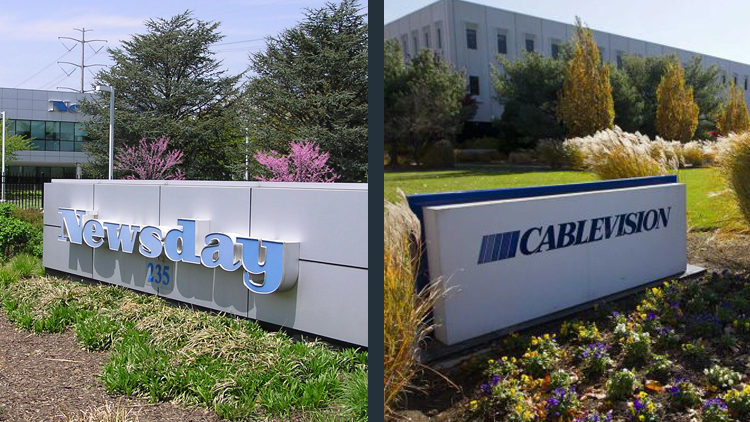Consolidation is coming to the American cable television industry, but what that portends for the future of Bethpage-based Cablevision Systems Corp. and their subsidiary, Newsday, is far from clear.
Earlier this year Comcast, the largest cable company in the country, announced its intention to buy Time Warner Cable, the nation’s second-largest cable company, for $45 billion, in a deal that still requires federal approval. The announcement fueled speculation that the other big cable operators, including Cablevision, which is reportedly the fourth-largest in the business with its 3 million subscribers, could be up for grabs. And if another company gobbled up Cablevision, would it retain or unload Newsday, which it acquired in 2008 from the Tribune Company for $650 million? With the Dolan family’s backing, Long Island’s lone daily newspaper has survived the downslide of the digital age, but it’s hard to tell if that would continue under new ownership.
Certainly, cable, not newspapers, is where all the acquisition action is these days.
“We have the financial flexibility to chase a few more rabbits,” John Malone, the billionaire investor whose holding company, Liberty Media, is Charter Communication’s largest stockholder, told Bloomberg News, referring to Charter’s bid for Time Warner Cable that it lost to Comcast.
Some industry analysts thought his comment meant that Cablevision was suddenly in the cross-hairs because Charter’s current chief executive, Thomas Rutledge, had once been a top dog at Cablevision until he resigned in December 2011 after not seeing eye to eye with Cablevision’s grand poobah, James Dolan. But, Malone had told Bloomberg in October that he didn’t see Cablevision as a merger target because it didn’t have room left to grow in the pay-TV households of Long Island.
Wall Street analysts agree.
“Relative to other operators, Cablevision suffers the worst of both worlds,” media analyst Craig Moffett wrote in a November report for Sanford C. Bernstein & Co., an investment research firm he then worked for. “Its starting penetration is already almost double its peers, making it harder to gain and easier to lose.”
If anyone outside the Dolan family knew the ins and outs of Cablevision, it would be Rutledge, asserted some analysts willing to dismiss any bad blood lingering between him and Dolan. The Cablevision scion himself added to the speculation when he gave a rare interview to The Wall Street Journal last summer when he refused to say whether the Dolans would still own the company two decades from now.
“You can’t rule out the possibility of a sale,” he admitted.
But, a big development in the cable industry last week significantly changes the dynamic, analysts say. On April 28, Charter and Comcast agreed on a deal that would let Charter pick up some 3 million subscribers that Comcast wants to divest while swapping its subscribers in areas of the country Charter prefers not to serve. Assuming the merger passes muster with the U.S. Department of Justice as well as the Federal Communications Commission, Charter would become dominant in the Midwest and Comcast Time Warner Cable would become dominant on both Coasts.
Just as importantly, Charter would become the second-largest cable company in the country behind Comcast, which would have 30 million subscribers, or about 30 percent of the cable industry. The prospect of one media entity wielding that much control doesn’t sit well with consumer advocates—or with U.S. Sen. Al Franken (D-Minn.), who criticized the merger at recent Senate committee hearings, calling it “a disaster.”
“We’ve been opposed to the Comcast Time Warner deal since it was announced,” said Harold Feld, senior vice president at Public Knowledge, a non-profit, pro-consumer group based in Washington, D.C. “Adding Charter into the mix has not made it any prettier from our perspective.”
But the new deals suggest that Cablevision is off the table—for now.
“Charter is not going to be in a position to make a big acquisition,” Feld told the Press. “Charter will need to take some time absorbing [Comcast’s subscribers] and restructuring before they could even think about acquiring somebody else.”
Industry analyst Craig Moffett, now at his own firm, MoffettNathanson LLC, put it this way: “The question used to be whether Cablevision is for sale. The question now is who would be the buyer?” Moffett told the Press.
“Comcast is restricted,” he said. “They’re selling subscribers to fit under the FCC’s ceiling. Time Warner Cable is out of the picture. Charter is divesting the last of its presence on the East Coast. I think at this point it would be hard to find a buyer.”
The prospects for Charter buying Cablevision definitely “took a hit,” according to Lance Vitanza, managing director and partner at CRT Capital Group, based in Stamford, Conn.
“If you thought a Cablevision deal was going to happen in the near term, now the timing is going to be pushed off,” he told the Press. “Charter is certainly not going to do another deal in the midst of doing this deal.”
A Cablevision representative declined to comment.
BATTLE OF THE BROADBAND
What’s been driving the cable industry to consolidate is the desire to gain leverage over the networks, content producers and program providers in order to stifle rising prices for retransmission and carrying fees.
It was a dispute over higher fees charged by the Fox Network that had led to Cablevision imposing a service blackout for two weeks in October 2010, which generated a class action lawsuit that is still winding its way through the federal justice system. In a similar scuffle last fall, Time Warner Cable blacked out the CBS network and its related channels, like Showtime, for almost a month in a dispute over how much it was paying for their programs and then had to concede defeat as the NFL football season began. As Time Warner Cable’s chairman and chief executive, Glenn Britt, told The New York Times, “We certainly didn’t get everything we wanted.”
Dolan had told the Journal last August that Cablevision’s position in the New York metropolitan market “helps us have more leverage than our size would dictate,” when it comes to pushing back against content providers’ strong-arm tactics to raise programming prices. But, he added that “there could come a day” when his company decides to drop TV and shift to broadband as its main offering.
“We are going to continue to do the right things for the shareholders,” he told the Journal.
“Cablevision has generally had the problem that the Dolan family has often been at odds with other investors,” said Feld, of Public Knowledge. “They have a good, compact market but they have never been successful at finding a good way to expand.”
An industry analyst based in the New York metropolitan area who spoke on background explained the skepticism prevailing on Wall Street regarding Cablevision’s James Dolan, who announced at the beginning of April that he was naming himself chief executive officer, his wife Kristin Dolan the new chief operating officer and Brian Sweeney the new president.
“For years there’s been a positive and a negative in Cablevision stock,” the investment expert told the Press. “The positive is that somebody someday is going to consolidate Manhattan and Long Island. But not anymore. Not for a very long time.
“The negative has always been called ‘The Jimmy Discount,’” the analyst continued. “People hate him. He’s not a great manager and he does stupid things. I think he bought Newsday with as much forethought as he bought Clearview Cinemas and the Whiz. I don’t think he ever gave a shit about journalism. But I think there are tax reasons why Newsday will hang on as part of Cablevision for a while to come.”
Last July, when Newsday announced that publisher Fred Groser was going to retire at the year’s end, New York Post media columnist Keith J. Kelly reported that his pending departure sparked “renewed speculation that parent Cablevision is readying the Long Island paper for a sale…” As it turned out, Kelly was wrong, but the rumors persist, fueled in March when Gordon McLeod was named publisher—the third one in the six years since the $4.4-billion cable operator bought Newsday.
Asked about the stubborn scuttlebutt that the Long Island tabloid is again on the auction block, Newsday deferred to Cablevision.
“As a matter of long-standing policy, we do not comment on rumors or speculation in the media,” a Cablevision spokeswoman said.
In its recent filings with the Securities and Exchange Commission, Cablevision reported that Newsday had suffered almost $150 million in operating losses over the last three years: $71.1 million in 2013, $47 million in 2012 and $31.7 million in 2011. According to Newsday’s most recent filing with the Alliance for Audited Media, the paper’s total average print circulation was approximately 255,000 on weekdays, about 251,000 on Saturdays and 313,000 on Sundays, representing a decline of a 6.4 percent, 5.3 percent and 5.6 percent, respectively, compared to a comparable period the year before.
“You simply can’t take a cable company and a newspaper and expect them to play nicely together,” says Jaci Clement, the director of the nonprofit Fair Media Council, an LI media watchdog group. “The philosophies are different. The products are different. The cultures are different.”
She said Cablevision’s ownership of Newsday has been a “lose-lose-lose situation” for the Island.
“Newsday is treated like an addition, not as an integral part of the operation,” she said. “[It] has been diminished from being one of the best metro papers in the country… The public has no diversity in the news offered by Newsday and News12…. Cablevision financially supported a candidate that Newsday endorsed yet Newsday repeatedly failed to disclose Cablevision’s contributions. Journalistically, that’s so bad it’s off the charts.”
But with Verizon FiOS a distant competitor—same goes for satellite TV—Cablevision is firmly in the driver’s seat and Long Islanders are just along for the ride.
































